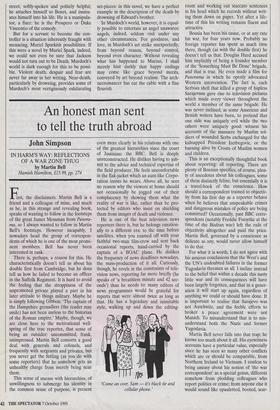A fine romance
Caroline Moore
JACKSON'S DILEMMA by Iris Murdoch Chatto, £15.99. pp. 249 This is pure Iris Murdoch; this is the real McCoy. Its relative brevity only inten- sifies the impression that this is somehow a distilled quintessence of her art. Such an assertion should provoke a collective sigh from the novel-reading public — of exasperation from some; but, from the majority, of relief and anticipatory content- ment.
There are some who just do not like Iris Murdoch's fiction: they will not like this one. They simply cannot see the allure of her strange, baroque world, where love and fear, happiness and despair sweep with unimpeded, cyclonic force — that mixture of hothouse emotions and cool art. Others find it irresistible: the literary equivalent of Baked Alaska. It is a nursery treat, satisfy- ing a sweet tooth for fairy tales; but one produced only through supreme skill, a triumph of art over nature. And at the end of the meal, one is left with all those philo- sophical conundrums to digest: sibylline questionings about the nature of love and goodness, art and reality, religion, mysti- cism and illusion.
Iris Murdoch herself once wrote that modern fiction could be divided into 'jour- nalistic' novels and 'crystalline' ones. Jour- nalistic fiction is realistic, set in the empirical world, fashioned from facts and dry details. 'Crystalline' fiction is a semi- allegorical rendering of the human condi- tion, a sort of symbolic fantasy. Iris Murdoch's detractors (though she is now so firmly established in the pantheon of the great that resistance is now almost an underground movement) belong to the journalistic school. They mutter sturdily that no one behaves, or talks, like that; that her characters are not rooted in the 'real' world.
Certainly, her characters never really work (though they may paint, or write philosophy, or the like); they may be described as poor, but they are never ground down by sordid monetary anxieties; there are servants, but few discernible nuances of class or background; and their clothes, their manners, their idioms, while invested with significance, belong to no recognisable era or social milieu. (Though there is an alternative school of thought which claims that such people can be found, but only in Oxford. I long to believe it, as I long to believe in the Abominable Snowman.) But the enchantment of Iris Murdoch's world, of her parodiable but inimitable artistic vision, is not so much that it is crystalline as that it is romantic. (I always feel somewhat take-it-or-leave-it about the symbolism, such as that invested in the ancient horse in this fable — who seems to suggest memory or tradition, the pleasures of passions put out to pasture.) Her novels often adapt romantic genres — the love- comedy, the gothic tale. And they are also romantic in subject and spirit.
Henry James defined romance in terms that fit the fiction of Iris Murdoch. Its subjects are the things
we never can directly know; the things that reach us only through the beautiful circuit and subterfuge of our thought and desire
— such as Murdoch's twinned preoccupa- tions, love and goodness. And it deals with experience liberated, so to speak, experience disengaged, disembodied; disencumbered, exempt from all our vulgar communities.
In James's image of exhilaration,
The balloon of experience is in fact of course tied to the earth, and under that necessity we swing, thanks to a rope of remarkable length, in the more or less commodious car of the imagination. The art of the necromancer is, 'for the fun of it', insidiously to cut the cable.
Here is a novel which swings the reader into the stratosphere. The central cast, as so often, is made up of a group of friends. They are gathering for a wedding: Edward Lannion, the golden-brown-haired, youth- ful, secretive and emotionally burdened owner of a half-Tudor, half-Georgian country house, is about to many Marian Berran, the protegee of Benet, who is the owner of the neighbouring estate. But on the morning before his wedding-day a stone is thrown through Edward's window; and on the eve of his wedding the bride vanishes.
In the wake of this disaster and mystery, the friends eddy, group and regroup, on the lines of romantic comedy: there is Mildred, the religious spinster, who is in love with Owen, the drunken painter and token homosexual, who is in love with Tuan, the black-haired, secretive, youthful and emotionally burdened theology student. Then there is Rosalind, Marian's sister, who dresses like a boy in homage to the best romantic comedy of them all; and Benet, the gentleman philosopher, who is the reluctant master of the mysterious Jackson.
Jackson is not introduced until page 48. I do not want to spoil the nursery treat by giving away too much, but it is difficult to discuss the novel without discussing him. He steps from the shadows in a London street, softly-spoken and politely helpful; he attaches himself to Benet, and insinu- ates himself into his life. He is a manipula- tor, a fixer: he is the Prospero or Duke Vincentio of the comedy.
But for a servant to become the con- troller is a situation inherently fraught with menacing, Muriel Sparkish possibilities. If this were a novel by Muriel Spark, indeed, we could not even he sure that Jackson would not turn out to be Death. Murdoch's world is dark enough for this to be possi- ble. Violent death, despair and fear are never far away in her writing. Near-death, particularly by drowning, provides some of Murdoch's most vertiginously exhilarating set-pieces: in this novel, we have a perfect example in the description of the death by drowning of Edward's brother.
In Murdoch's world, however, it is equal- ly possible to entertain an angel unawares: angels, indeed, seldom visit under any other circumstances. For goodness, and love, in Murdoch's art strike unexpectedly, from beyond reason, beyond control, beyond even character. Without revealing what has happened to Marian, I shall merely hint darkly that happy endings may come like grace beyond merits, conveyed by art beyond realism. The arch- necromancer has cut the cable with a fine flourish.











































































 Previous page
Previous page